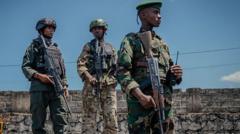Rwanda has chosen to exit the Eccas due to accusations of conflict interference in DR Congo and denial of its right to a leadership role, amidst efforts for conflict resolution in the region.
Rwanda Exits Central African Bloc Amid Tensions Over DR Congo Crisis

Rwanda Exits Central African Bloc Amid Tensions Over DR Congo Crisis
Rwanda announces withdrawal from the Economic Community of Central African States (Eccas), citing unfair treatment amid ongoing conflict with DR Congo.
In a significant diplomatic move, Rwanda has officially declared its withdrawal from the Economic Community of Central African States (Eccas), following escalating tensions stemming from its alleged involvement in the conflict within the eastern Democratic Republic of Congo (DR Congo). The decision to leave comes after Rwanda was denied the opportunity to assume the organization's rotating chairmanship during a recent summit held in Equatorial Guinea.
The Rwandan government expressed strong dissatisfaction with this treatment, asserting that its claim to the chairmanship was "deliberately ignored" to align with the wishes of the Congolese authorities. "We see no justification for remaining in an organization whose current functioning runs counter to its founding principles and intended purpose," stated a Rwandan official, emphasizing the nation's stance on the matter.
This diplomatic rift arises as regional leaders strive to bring an end to the hostilities in eastern DR Congo. Negotiations, facilitated by the US, are currently being pursued to finalize a draft peace plan that both Rwanda and DR Congo hope to endorse by the end of the month.
During the summit, the leaders of Eccas acknowledged what they termed "aggression" from Rwanda towards the Democratic Republic of Congo and publicly ordered the withdrawal of Rwandan troops from Congolese territory. Until a resolution is reached, Equatorial Guinea has been appointed to continue in the chairmanship role, further complicating Rwanda's position within the bloc.
Congolese spokesperson Patrick Muyaya remarked that "one cannot continually and voluntarily violate the principles that underpin our regional institutions and claim to want to preside over them," thereby suggesting that this decision should serve as a precedent for other regional organizations to adopt a more robust position against Rwanda.
Multiple international entities, including the US and France, have accused Rwanda of providing support to the M23 rebel group, which has made significant territorial gains in the eastern regions of DR Congo, including capturing major cities like Goma and Bukavu. A UN report last year alleged the presence of Rwandan soldiers fighting alongside the rebels—claims that Rwanda has consistently denied, maintaining that its troops are stationed at the border solely for protective measures against spillover conflict.
This is not the first instance of Rwanda stepping back from Eccas; the country previously left the organization in 2007 but rejoined several years later. The current situation remains volatile, with significant implications for regional stability in Central Africa.
The Rwandan government expressed strong dissatisfaction with this treatment, asserting that its claim to the chairmanship was "deliberately ignored" to align with the wishes of the Congolese authorities. "We see no justification for remaining in an organization whose current functioning runs counter to its founding principles and intended purpose," stated a Rwandan official, emphasizing the nation's stance on the matter.
This diplomatic rift arises as regional leaders strive to bring an end to the hostilities in eastern DR Congo. Negotiations, facilitated by the US, are currently being pursued to finalize a draft peace plan that both Rwanda and DR Congo hope to endorse by the end of the month.
During the summit, the leaders of Eccas acknowledged what they termed "aggression" from Rwanda towards the Democratic Republic of Congo and publicly ordered the withdrawal of Rwandan troops from Congolese territory. Until a resolution is reached, Equatorial Guinea has been appointed to continue in the chairmanship role, further complicating Rwanda's position within the bloc.
Congolese spokesperson Patrick Muyaya remarked that "one cannot continually and voluntarily violate the principles that underpin our regional institutions and claim to want to preside over them," thereby suggesting that this decision should serve as a precedent for other regional organizations to adopt a more robust position against Rwanda.
Multiple international entities, including the US and France, have accused Rwanda of providing support to the M23 rebel group, which has made significant territorial gains in the eastern regions of DR Congo, including capturing major cities like Goma and Bukavu. A UN report last year alleged the presence of Rwandan soldiers fighting alongside the rebels—claims that Rwanda has consistently denied, maintaining that its troops are stationed at the border solely for protective measures against spillover conflict.
This is not the first instance of Rwanda stepping back from Eccas; the country previously left the organization in 2007 but rejoined several years later. The current situation remains volatile, with significant implications for regional stability in Central Africa.





















